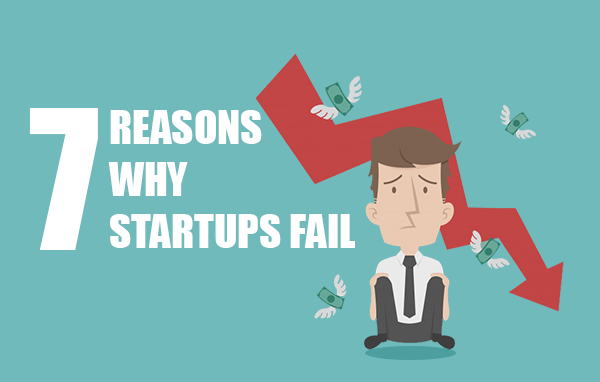7 Reasons Why Startups Fail
With a country of over 1.3 billion population, it won’t be astonishing to know that India has the second largest Startup ecosystem in the world. An ecosystem that hosts over 20,000 startups currently and with an annual growth of 12-15% every year. Implying that, we can easily assume that at least 6-8 startups are born every day in India. However, it would be astonishing to know that only around 10 percent of these startups surfaces to the top and rises. Though this success rate has been growing steadily for the past 3-4 years, it is still desolating to see a great chunk of this segment failing to make it to the bigger picture.

Looking deeper into this issue, it was found that the majority of the startups bomb in the initial 1-3 years and falls flat. Though there are a number of reasons behind their failure, here are the foremost reasons why a majority of the startups fail
- No Business Plan
No matter how easy it may sound, a proper B-Plan is the core of starting any business. Not having a well thought out Business Plan and strategy from the very beginning can lead to one bad decision after another. While a number of startups neglect this process or prepare a makeshift B-Plan, there are many startups who write their Business Plan only to raise funds. It should be clear that a B-Plan not only helps to support growth and secure funding but also to map the future and manage a strategic exit.
- Disregarding an Alter Course
No matter how innovative your idea is and no matter how strongly you uphold its success in future, it is always advisable to chalk an alter course for your business. Because of the strong affection with the first idea, most of the budding startups stick to it, regardless of realizing its drawbacks. Such decisions induce loss of time, assets, efforts and money resulting in failures.
- Incompetent manpower selection
We all know how fun it is to work with the people whom we know. It creates an ambience of enthusiasm and joy when you work with your friends or known acquaintance. A study shows that majority of the startup founders approach their first circle of friends and relatives for work without assessing their level of knowledge and competency for building the product. In a rush to dispatch their product early, new businesses tend to assemble groups with individuals who have almost no enthusiasm, knowledge of the product. This prompts to disappointing results as the people working could not deliver the desired results.
- An absence of guidance or consultant
Though your idea is a great one, it is always recommended to have a mentor for the initial stages of your startup at least. And no matter how easy it may seem, it is extremely difficult to find the right Guide for your venture in a country where almost every other face is a “startup guru”. A right coach can supervise you in your crucial as well as everyday decisions that would restrain you from tumbling off the track.
- Superficial Unit Economics
An aspiring entrepreneur should always calculate the total amount of expenditure to be borne by the business in order to sustain for a certain period of time or until s/he can find an interested Investor. Profits don’t start immediately and it might take even months or years to reach breakeven. Most of the startups fail to evaluate this and exhaust their initial capital even before their first return. Hence, most of the startups in India fail to remain bootstrapped for long.
The situation is again indifferent when it comes to startups that have successfully raised funding but now have no clue about how to allocate it in the venture. Excessive funding results in startup burning more money without thinking about unit economics. But when they are not able to raise successive rounds of funding they have to shut down.
- Lack of innovation
A majority of the aspiring entrepreneurs get dazzled by the glittering startup ecosystem and jumps into it with no proper idea or product planning. Eventually, they just end up with replicating what’s already present in the market and does not sustain long. While there’s another set of entrepreneurs who try match the current best in the market and start chasing competitor’s product goal, ending up losing their individuality and core strength. In both the above-mentioned cases of failures, the entrepreneurs fail to identify their core strength and implement innovation in their process. This would lead to nothing but a pile of mass-produced dummies, ready to sink deep along with the startup.
- Equity Dilution
Giving up a large portion of equity in the earlier stages results in the onboarding too many investors, leading to ambiguity in decision making and lack of precision in work.

Worked as a Due Diligence Audit Associate for two years with HSBC ( Asia- Pacific Region), ultimately gaining experience in AML, Liaising and Coordination, Annual and Periodical Reviews, Sanctions and Financial Crime Compliance. In addition to this, I was also delegated with Client Servicing, MIS Reporting, and Process Management related work.
